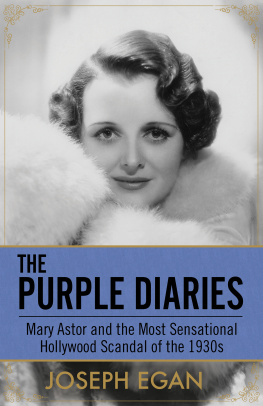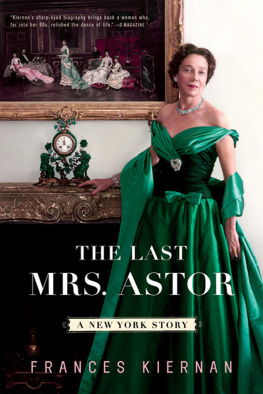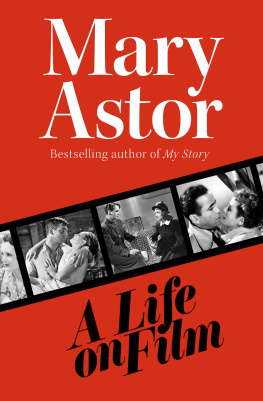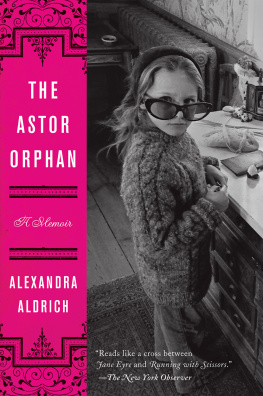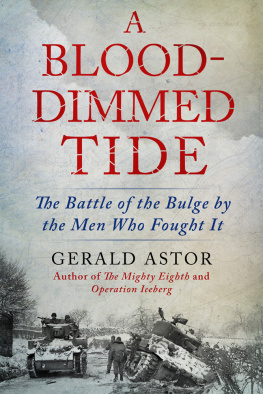First Mariner Books edition 2009
Copyright 2008 by Meryl Gordon
ALL RIGHTS RESERVED
For information about permission to reproduce selections from this book, write to or to Permissions, Houghton Mifflin Harcourt Publishing Company, 3 Park Avenue, 19th Floor, New York, New York 10016.
www.hmhco.com
The Library of Congress has cataloged the print edition as follows:
Gordon, Meryl.
Mrs. Astor regrets : the hidden betrayals of a family beyond reproach / Meryl Gordon.
p. cm.
Includes bibliographical references and index.
ISBN 978-0-618-89373-7 (alk. paper)
1. Astor, Brooke. 2. SocialitesNew York (State)New YorkBiography.
3. PhilanthropistsNew York (State)New YorkBiography.
4. New York (N.Y.)Biography. I. Title.
CT 275. A 847 G 67 2008
974.7'043092dc22 [ B ] 2008034893
ISBN 978-0-547-24798-4 (pbk.)
e ISBN 978-0-547-34827-8
v4.1116
To Walter
Now more than ever
To my parents
Adventurous, passionate, supportive
Prologue
Trial by Tabloid
W HEN GOD CREATED TABLOIDS , that Tuesday after Thanksgiving was surely the kind of day he had in mind. On the morning of November 27, 2007, New York Citys two leading practitioners of that irreverent style of newspapering were thirsty for blue blood. Though the New York Times maintained judicious restraint, both the Post and the Daily News bannered the latest twist in the most talked-about high-society scandal in years, the saga of the late Brooke Astor and her only child, Anthony Marshall. She was, of course, the glamorous socialite and philanthropist who had transformed herself, thanks to cranky Vincent Astors charming fortune, into a beloved philanthropist and influential American icon.
Her son, a clubbable war hero, former ambassador, and award-winning Broadway producer, had been transformed at age eighty-three from the epitome of WASP rectitude to a handcuffed suspect facing an eighteen-count indictment. Tony Marshalls fall from grace was abetted by his mother, his son, his attorney (who was charged in the same indictment), and the tabloids (which were just doing their thing). Charged with grand larceny, falsifying business records, conspiracy, and possession of stolen property, Marshall was looking at the specter of a quarter-century behind bars. BAD BOY, scolded the News. CROOK ASTOR, snarled the Post.
The headlines referred to his alleged scheme to swindle his mothers millions from her favored cultural institutions (including the Metropolitan Museum of Art and the New York Public Library) into his own accounts. But the case was always as much about family as it was about money. It began sixteen months earlier with the seismic jolt from charges by Tony Marshalls son Philip, a college professor, who alleged that his 104-year-old grandmother had descended from Park Avenue splendor to gentrified squalor (despite eight squabbling servants). Taken up with lynch-mob ferocity by the tabloids were such allegations as Tonys seemingly selfish refusal to allow his mother to visit her country estate, his inexplicable sale of her favorite painting, and the claim that Mrs. Astor (yes, Mrs. Astor) was spending her declining days lying on a dog-urine-stained couch.
So began this upper-crust reality soap opera. Here in a nouveau riche age was Americas true aristocracy, the arbiters of society, the twenty-first centurys link to the New York of Edith Wharton and Henry James. But in this world of emeralds and Astors, things were not always what they seemed. Resentments seethed just below the surface, and ambition was cloaked in polished manners. The hired help, from the butler to the social secretary to Mrs. Astors nurses, would be drawn into the fray, testing their loyalty and discretion.
Past and present intertwined during the final reels of the Brooke Astor story, harking back to her failures as a mother and to the girl she had been, a teenage bride married off to a dashing millionaire whose acts of violence would haunt her for more than eighty years. This family drama involved a son whose mother, father, and succession of stepfathers left him with no sense of how a loving parent might behave. And then there was the money, nearly $200 million, a ruthless American fortune built on the lust for fur pelts and Manhattan real estate.
At 7:58 A.M ., Tony Marshall arrived at the Manhattan district attorneys office at One Hogan Place to turn himself in. White-haired and courtly, he wore a dark, well-tailored suit with his Marine Corps tie and clasp, clinging defiantly to these symbols of accomplishment and propriety. In the grim squad room on the ninth floor, Marshall was given paperwork to fill outthe business of being arrested. With its fluorescent lights, beat-up furniture, stacked water-cooler bottles, and jail cell with rusted metal bars, this setting must have seemed a harsh rebuke to a man accustomed to antiques, fine art, and regularly freshened floral arrangements.
In the upper reaches of society, it is not enough to acquire wealth; it must be protected from interlopers, some of whom are family members. As a young man in his twenties, Tony Marshall made his first court appearance, nearby in another Foley Square building, when his biological father unsuccessfully sued him in an effort to wrest away Tonys trust fund. Brooke Astor had been taken to court over money as well, battling to protect her full share of Vincent Astors millions and fend off claims from one of her husbands aggrieved family members.
But these squabbles had been mere civil matters, quarrels among family members without the involvement of the authorities. Tony Marshall was handcuffed when detectives escorted him downstairs for his mug shot and fingerprinting. The latter proved surprisingly complicated. Modern fingerprinting machines are not calibrated for aging digits, which leave indistinct markings. Several attempts were made before the detectives finally resorted to the ink method. Back in the squad room, Marshall was offered a nutrition bar, orange juice, and a banana, but declined. A member of the Knickerbocker Club, the New York Racquet Club, and the Brook Club, on a normal day he would have been lunching among the citys elite.
By the time he was paraded in full perp-walk fashion across the street to the courthouse at 111 Centre Street, his face was ashen and his hair disheveled. Here was another photo opportunity in the unrehearsed spectacle of New York, seized on by the mobs of cameramen and journalists who had been staking out the building for six hours, eager to capture Tony Marshalls downfall in time for the news at five. A news vendor hawking a stack of newspapers yelled out, The rich stealing from the rich, find out what happened. Spying the defendant, the vendor cried out, Mr. Marshall, why did you do it? Do you have anything to say?
Walking slowly into the courtroom, Tony appeared to have aged dramatically in just a few hours, the portrait of Dorian Gray. His alarmed wife, Charlene, hurried up the aisle and wrapped her arms around him, covering his face with kisses. As she ran her hands through his mussed hair, Tony wiped tears from his eyes. Grasping his arm in support, Charlene walked down the aisle by his side, repeating, Well be okay, well be okay. Moments later he joined his lawyers at the wooden table and faced Justice A. Kirke Bartley, Jr., a former prosecutor known for trying mob boss John Gotti.
Rising to her feet as the hearing began, the prosecutor Elizabeth Loewy solemnly told the judge, Despite his mothers generosity when she was well, he used his position of trust to steal from her. Handed a copy of the indictment accusing him of fraud, conspiracy, and theft, Tony Marshall read through it slowly, as if having trouble comprehending the words. When asked to respond to the charges, he whispered, Not guilty.
Next page


